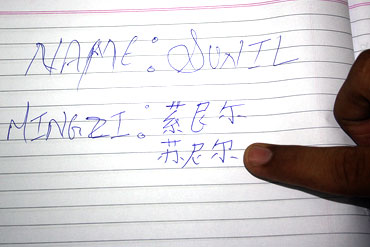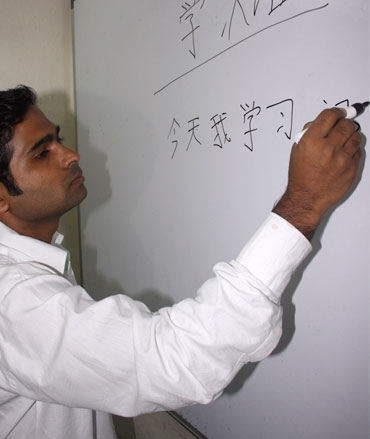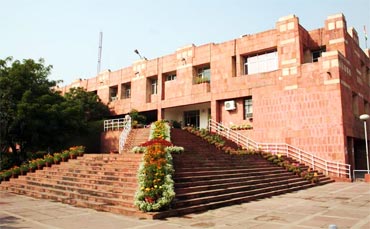
The Central Board of Secondary Education is all set to introduce Mandarin Chinese in Class 6 from April 'in view of China emerging as one of the major global economies and Mandarin being spoken by a large population of the world'.
India and China have over 4,000 kilometres of unsettled border between them, but are trading more fiercely than ever.
Last year, China displaced the US as India's largest trading partner.
According to Dr B R Deepak, Associate Professor of Chinese, Centre of Chinese and Southeast Asian Studies, Jawaharlal Nehru University in New Delhi, bilateral trade is expected to cross $60 billion this year.
When he says it makes sense for young Indians to learn Mandarin there are good reasons you believe him.
Dr Deepak points out that over 150 Indian companies have invested in China and over 50 Chinese companies including telecom majors Huawei and ZTE have thousands of Indian employees in India.
"The opportunities thrown open by economic and trade relations are immense," he says. "More and more people would like to seize this opportunity to make big or secure their future."
"Academic institutions are also absorbing a great number of Chinese experts," he adds. "Many government as well as private institutions have opened up Chinese courses, the recent one being IIT-Madras."
According to Dr Deepak it is not just the corporate sector that is hunting for Mandarin speakers.
Government agencies -- especially the Union ministries of defence, external affairs and home -- often require expertise in the Chinese language, he points out.
But the largest group of people wanting to learn Mandarin are from the business sector.

"In the early 2000s Japanese and Korean were the sought after languages. Today it's Chinese. The craze for Chinese grew around 2005 when the business between the two countries grew."
Amit Sakhrani, who runs a language institute in Mumbai, says that of his 30-student strong batch, most are businessmen looking at expanding or those who have expanded their businesses to China.
"China is becoming the fastest growing business hub," he says adding that it also helps that the trade relations between the two countries have been improving for a while now.
Excel Academy, Sakhrani's institute, has been around for eight years. He says the demand for Mandarin has been steadily increasing for the last four years.
The course at Excel is divided into six levels. The first four levels are of two months duration each while the last two levels are of three months duration each. The cost of each course is between Rs 5,000 and Rs 6,000.
Over the last few months Sakhrani has noticed a new trend. "Some time ago, a couple came with their two-year-old asking if we could teach him! They said since Mandarin would be the language everyone will be speaking soon, it made sense for their child to start young."

Sunil Kumar, who works for Zhongwen: The School of Chinese Language in Kolkata, says that last year he received over 100 requests from parents who want their children to learn the language. Some of his students are of Chinese origin too.
"The Chinese community in Kolkata speak Cantonese, which is a very different dialect from Mandarin."
"Some of the younger people don't speak Cantonese either. To learn to speak the language of the Chinese, they must learn Mandarin," he says.
While the script can be very daunting, Kumar says learning Mandarin is not very difficult. "It usually takes three years to be fluent in the language. If you are living in China it is even better. People have known to be fluent in as little as a year."
Zhongwen offers a variety of courses for students of the Chinese language -- from a one-month long basic course for tourists (Rs 4,500) to a three-year intensive one (Rs 26,000 per year).
It also offers a joint certificate course in association with the University of Calcutta. The eight-month long course is subsidised and costs Rs 800 per month.

"There are many Indian companies looking to trade with China today and are always on the lookout for people to translate for them."
He adds that while graduation in any stream and a good working knowledge of the language will do just fine, a degree in engineering or business management enhances the prospects manifold.
"If you have an MBA you can easily start off with a package of Rs 3.5 lakh to Rs 4 lakh (Rs 350,000 to Rs 400,000) per year."
The course at New Delhi Languages is divided into three modules of 60 hours each with a batch of not more than 12 students. These models essentially equip you in conversational skills and cost Rs 8,500 each.
According to Amit Sakhrani from Excel Institute in Mumbai, the going rate for translation can range anywhere between Rs 3 and Rs 6 per word.
"Depending on how good you are, you can easily make Rs 30,000 to Rs 50,000 per month," he says.

"Our students have been absorbed by various multinationals like Oracle, HCL, American Express, TCS, Infosys, Huawei, ZTE and many others."
"The pay can be as high as Rs 60,000 per month," he says. "If you have an IT, finance or economics background, it adds to your market value."
Although it isn't a very popular option, teaching Mandarin in departments and centres of Chinese at various Indian universities is something that Dr Deepak says is well worth considering.
"To become a lecturer in any Indian university, you must have a master's degree and should have cleared the National Entrance Test."
The Union Public Service Commission also advertises for translators in various ministries.
A recent advertisement for the Ministry of External Affairs seeks applications for the post of a junior translator. To apply you must have one of the following:
A master's degree in the Chinese language with English as a compulsory or elective subject at the degree level from a recognised university.
Or any bachelor's degree with English as a compulsory/elective subject from a recognised university and a diploma equivalent to interpretership standards in the Chinese language from a recognised university along with three years' experience as a translator/interpreter in the Chinese language to English/Hindi and vice-versa or in teaching the Chinese language.
For those who are seriously inclined towards studying the language, Dr Deepak recommends university courses that introduce you not just to the language but also the culture of China.

"The BA and MA courses at JNU are for three and two years respectively. Being a central university, the course is highly subsidised (about Rs 600 per semester).
There are a couple of entry points to the courses, but the minimum requirements for the BA course are a 10+2 education.
Minimum requirements for the MA course are a BA in Chinese or a three-year equivalent.
Since these courses are in demand, the cut-off for the BA course is usually as high as 90 per cent at the 12th grade.
Prospective students are tested on their general knowledge, mental reasoning and language ability.
If you attend classes regularly there shouldn't be any reason why you cannot be fluent in Mandarin Chinese in three years," he says.
Some others universities/institutes Dr Deepak recommends for learning the language:
Offices of the institutes quoted in this article:
Excel Academy: 309, Shoppers' Point, SV Road, Andheri (West) Mumbai. Tel: 022-67256767.
Zhongwen: The School of Chinese Language: 11/1 Sunny Park, Kolkata 700019. Tel: 033- 24858399.
New Delhi Languages: 2/34, IInd Floor, Ramesh Nagar, New Delhi. Tel: 011- 45641918.